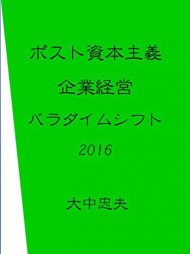Corporate Sustainability Governance (English Edition) [Kindle版]
This booklet discusses a key question about the objective of corporate governance in the 21st century: Which of ‘ROE (Return on Equity)’ or ‘Corporate Sustainability’ should be selected as the supreme goal of corporate governance? It is also a question of whether “Investors’ Property” or “Social Entity” should be selected as the definition of corporation.
For the discussion, financial data of 460 manufacturing corporations in Japan for the period of 1993-2012 are reviewed to analyze the extent their R&D (Research & Development) and Quality Control competencies have declined since 2004, when a shift of corporation definition from traditional “Social Entity” to “Investors’ Property” emerged in Japan. Also analyzed is the contribution share of US manufacturing industries to the US GDP for the period of 1997-2013, in order to estimate the extent the value added creativity of the US manufacturing corporations - having been assumed historically as “Investors’ Property” - has declined during the past 17 year period.
As a conclusion from the analyses, in order to overcome the recent self-consuming cycle of manufacturing corporations in Japan and the USA, this booklet proposes the shift of the objective of corporate governance from maximizing ‘ROE’ to ‘Corporate Sustainability’. It is also a proposal for all industrial corporations in matured societies to recognize that the time has come that corporations liberate themselves from the yoke of monetarism philosophy and mission. Also proposed are primarily necessary tools and organizational change models for realizing the shift: Balanced Scorecard and advanced corporate sustainability models of Unilever, GE, P&G (Procter & Gamble), and 12 manufacturing corporations in Japan.

 ダウンロード
ダウンロード
 説明会
説明会
 入試情報
入試情報





![Corporate Sustainability Governance (English Edition) [Kindle版]](https://mba.nucba.ac.jp/archives/025/201511/3b4f8cee32aa382d9f24fe1240c9bf25.jpg)
![新企業統治 [Kindle版]](/archives/025/201509/mode3_w190-59e7cc2a599dacd232d1d7aed87abae6.jpg)
